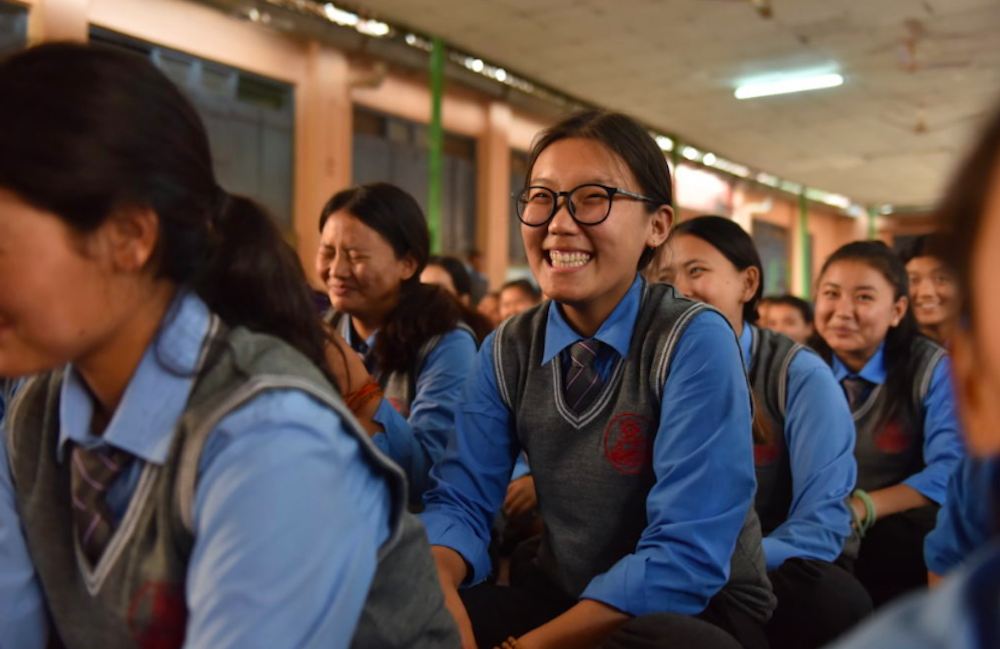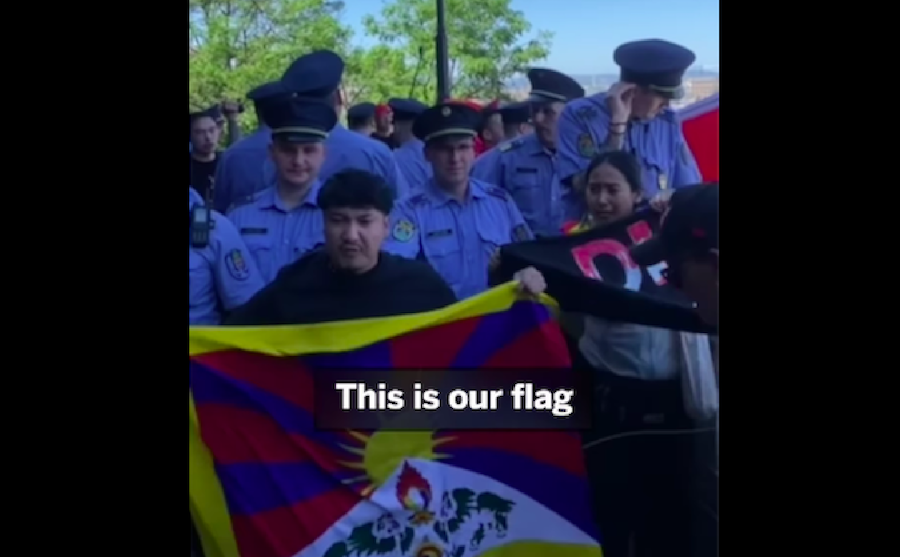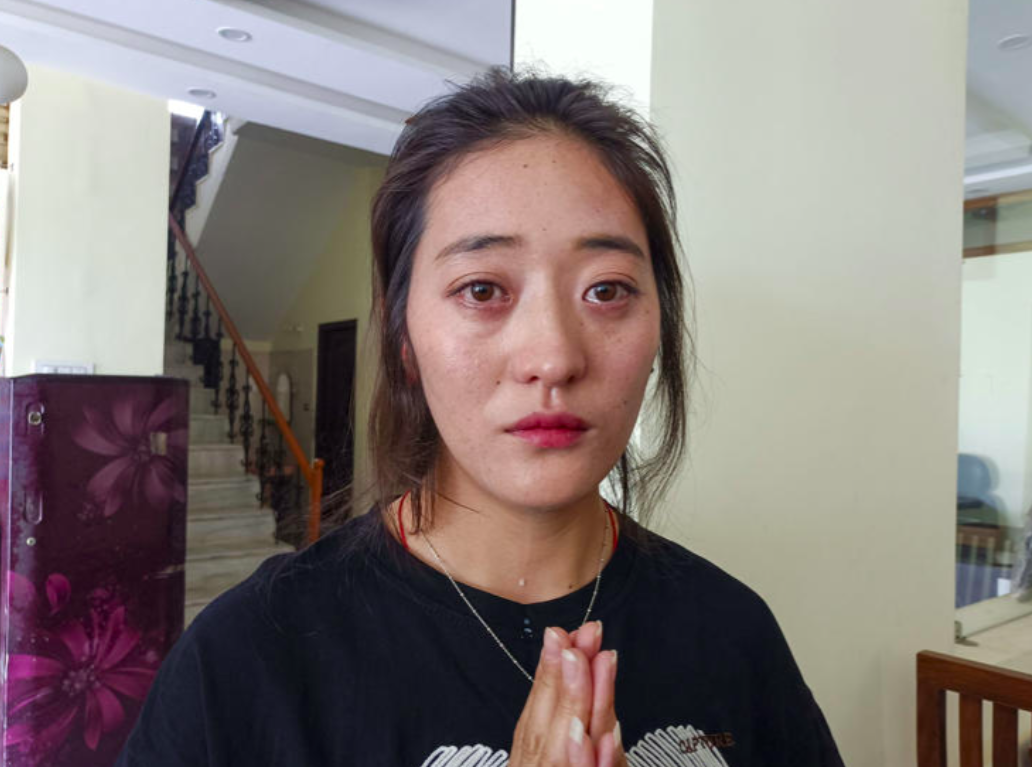BLOOMINGTON, Indiana – The Dalai Lama has been here before.
He has been to Bloomington, and countless other cities around the nation, to talk up the plight of his Tibetan compatriots, thousands of whom have lived in exile for nearly 50 years since a failed uprising against China.
He has met with politicians and presidents, visiting President Bush yesterday, trying to get them to exert pressure on China to start substantive dialogue with the Tibetan government-in-exile.
And he has been to Boston, where he is to return tomorrow, trying to raise the spirits of local Tibetan-Americans, reach out to Western Buddhists, and bolster public awareness of his cause.
But, at the age of 68, calling himself just “one old monk,” the Dalai Lama acknowledges that he has little to show for his effort to win freedom for his people, who are increasingly frustrated with the slow pace of change. His advocacy of nonviolence is winning few adherents — the United States ignored his appeal to show restraint after the terrorist attacks of Sept. 11, and, throughout the world violence is routinely used to force political change. Even the Dalai Lama’s older brother, a retired professor at Indiana University, is urging a more hard-line approach to China, which claims Tibet as part of its territory.
In a wide-ranging interview Sunday, during a visit to a Tibetan Cultural Center here in Bloomington, the Dalai Lama acknowledged that his uncompromising support for nonviolence, which won him the Nobel Peace Prize in 1989, is frustrating to many Tibetans. But, even as he prepared to attend a memorial service in Washington today to mark the second anniversary of the Sept. 11 terrorist attacks, the Dalai Lama insisted that nonviolence is always the right choice.
“The [goal], to try to reduce terrorism, is right,” he said. “But in the long run, I always believe through transformation of heart, that’s the ultimate real method to the elimination of terrorism. So in that case, compassion and friendship, dialogue and understanding, that’s the only way to transform the emotion of the human heart. Force cannot change the human mind, human heart.”
The Dalai Lama is actually the 14th Dalai Lama, the fifth child of poor farmers who at the age of 3 was discovered by a search party sent by the Tibetan government to identify the latest reincarnation of the Bodhisattva of Compassion.
Young Tenzin Gyatso was taken to a monastery for education; in 1940, when he was 5, he was installed as the spiritual leader of Tibetan Buddhists, and since 1950, when the Chinese military began to move into Tibet, he has also headed the Tibetan government, which he led into exile in India in 1959. The Dalai Lama has visited the United States 15 times since 1979, generally with three missions — to minister to Tibetan exiles, to keep public attention on the Tibetan cause, and to reach out to Western Buddhists. In Greater Boston, for example, the Dalai Lama tomorrow is to consecrate a Tibetan Buddhist temple in Medford and then speak to Tibetan Buddhists at Harvard; on Sunday he is to offer a teaching on Buddhism to 12,000 people at the FleetCenter, and on Monday he is slated to talk at Harvard about the Asian political situation.
But this year’s trip, which began last week in San Francisco and will conclude next week in New York, also has an added focus — science. On Saturday and Sunday, the Dalai Lama will headline a two-day conference at Massachusetts Institute of Technology on the science of the brain, as part of a collaboration between Buddhists and scientists that includes a bid to determine what physiological changes, if any, take place when Buddhists meditate. His current trip comes as the Dalai Lama is aging, and there is increasing talk among Tibetans about their future. Yesterday, President Bush promised to push for change by China, but did not call for any specific change in the governance of Tibet.
“The president reiterated our strong commitment to support the preservation of Tibet’s unique religious, cultural and linguistic identity, and the protection of human rights of all Tibetans,” White House press secretary Scott McClellan said at a news briefing in Washington. “The president also declared his strong support for the Dalai Lama’s commitment to the dialogue with China. The president said he would seek ways to encourage China to continue the dialogue on a substantive basis, and expressed his hope that the Chinese government would respond favorably.”
But the Dalai Lama acknowledges there has been little progress over his four decades of trying to persuade China to ease up on the Tibetan people, and in fact, many Tibetans believe conditions are worsening. In the interview Sunday, the Dalai Lama said he believes public opinion is increasingly favorable to his cause.
“At the government level, [there has been] not much progress, but at the public level, there is progress,” he said. “More and more Chinese intellectuals, and more Chinese on the street, including students, are showing their support, their sympathy, their solidarity.”
But the Dalai Lama said Tibet is not benefitting from the economic or political improvements in the rest of China, and that Tibetans are increasingly frustrated.
The Dalai Lama is at the moderate end of Tibetan politics. He says he does not advocate Tibetan independence, but rather is pushing “genuine autonomy” for Tibet as part of China.
But his own brother, Thubten J. Norbu, supports full independence, as do many other Tibetans.
“I’m really committed to fight for full independence,” said Ngawang N. Sherpa, 52, president of the Tibetan Association of Boston, an organization representing the estimated 400 Tibetans living in the Boston area. “Conditions in Tibet are worsening every year.”
Sherpa and others said that an increasing number of Tibetans are questioning the wisdom of nonviolence as a strategy.
“The youngsters are getting more frustrated, because it’s been too long and the international [community] is not paying attention,” he said. “If we’re just peaceful, nobody pays attention. But in this world, anywhere there’s a suicide bomb, the international [community] and the media put their attention there, and that makes people think maybe we should do something to bring their attention to us.”
Lobsang Sangay, a Tibetan doctoral student at Harvard Law School, said many young Tibetans have become radicalized by the lack of progress.
“Tibetan youth see that nonviolence and compromise is not going to work with the Chinese government, and believe that the best course to pursue our goal is a conventional national struggle,” he said. “The reservation is not against the Dalai Lama, but against the hardened policy of the Chinese government.”
Some Tibetans may be feeling frustrated because their cause has been fading from the headlines. The Tibetan issue received broad public attention during the 1990s, after the Dalai Lama won the Nobel Peace Prize and as several movies about Tibet were released, including “Seven Years in Tibet” and “Kundun” in 1997.
“The whole romance with Tibet has started fading,” said Frank Korom, an assistant professor of religion and anthropology at Boston University who studies Tibetan refugees. “And there are these voices of dissent questioning his absolute authority.”
The Dalai Lama acknowledges the concern, but insists that nonviolence is essential, not only for moral reasons, but also pragmatic ones. “In the future, we have to live side by side with Chinese as brothers and sisters,” he said. “So therefore, in the future, in order to live happily, friendly, with compassion, while we are carrying out this struggle we must avoid violence because it breeds more violence.”
But he said it has become increasingly difficult to justify his approach to Tibetans.
As for his own future, the Dalai Lama said he expects to be reincarnated outside of Tibet, where his successor would be free to push for change. He said his successor could be a non-Tibetan, and even a woman, but declined to speculate on what the impact of such a change would be, saying “it would really depend on the individual.”
Michael Paulson can be reached at mpaulson@globe.com.
A pursuit of peace in a violent world
Edited excerpts from an interview with the Dalai Lama, conducted by Globe reporter Michael Paulson on Sunday at the Chamtse Ling Temple at the Tibetan Cultural Center in Bloomington, Ind. The Dalai Lama spoke mostly in English, but at times spoke in Tibetan, which was translated by an aide.
Q. You urged a nonviolent response to Sept. 11. In hindsight, was that the right thing to do?
A. Oh yes. Of course. Generally I always feel that violence is against human nature, and in the present world situation the violent method may solve one problem, but may create another problem. So the side-effects are, I think, very bad. So therefore, I always believe the nonviolent method is the best.
Q. How do you think your position has affected your relationship with the Bush administration?
A. Of course, I do appreciate their motivation, the administration’s motivation. They try to reduce the force of terrorism. … The motivation is good. And of course, terrorism is very serious violence. And usually terrorism suffers ordinary people most. … But in the long run, I always believe through transformation of heart, that’s the ultimate real method to the elimination of terrorism. So in that case, compassion and friendship, dialogue and understanding, that’s the only way to transform the emotion of human heart. Force cannot change the human mind, the human heart.
Q. Dialogue and compassion even with terrorists?
A. Yes.
Q. What are you seeking from President Bush?
A. I ask President Bush, as other civic leaders, that they try to achieve a meaningful dialogue with the Chinese government … I am not seeking independence [for Tibet]. I am seeking genuine autonomy … which China’s constitution provided. So I believe I’m seeking certain rights according to the Chinese constitution.
The situation in Tibet and the situation in mainland China have big differences. In China – the economy of mainland China is changing much [for the] better. … Still, the economic situation of Tibet is much, much lower. … Then, in the political field, in China proper, there is more freedom, comparatively, compared to two years ago, or 20 years ago, much more freedom. But in Tibet, much more suppression. So still, unfortunately, the rule of terror is still prevalent.
Q. What do you say to young Tibetans who want a more traditional nationalist struggle, a more aggressive approach to China?
A. Yes, there are some [such] groups, not only on the outside, but inside Tibet. I always tell these people, their slogan, violence is easy, but in practice it’s not that easy. More important, in the future, we have to live side by side with Chinese as brothers and sisters. So therefore, in the future, in order to live happily, friendly, with compassion, while we are carrying out this struggle we must avoid violence because it breeds more violence.
Q. Do you think your approach has produced progress?
A. At the government level, not much progress, but at the public level, there is progress. More and more Chinese intellectuals, and more Chinese on the street, including students, are showing their support… their solidarity. And also more and more Chinese are showing genuine interest about Tibetan Buddhism …
Q. Do you expect to be reincarnated, and, if so, does it have to be in Tibet?
A. Now whether Dalai Lama institution should continue or not is up to the Tibetan people. That I made clear as early as ’69. But if I die within, say, the next few months or few years, most probably, I think, the Tibetan people will want to have another reincarnation. In that case, if we remain still outside Tibet … then, logically, that reincarnation will appear outside Tibet, because the main purpose of the reincarnation is to succeed the previous life’s work.
Q. So what would it mean for Tibetan cultural identity if the reincarnation of the Dalai Lama were European or American or somebody who was not ethnically Tibetan?
A. It would really depend on the individual. But in the past, the fourth Dalai Lama was Mongolian, not Tibetan – of course Mongolia and Tibet are very close nations. Now, perhaps, in 21st century, Tibetans and Europeans are also very close. So I don’t know, it is possible. Also, I have mentioned, theoretically speaking, even a female Dalai Lama is also possible.
Q. As you know, many people in the US are adopting some of the practices of Buddhism, like meditation, but not the religious beliefs. Is that OK?
A. It’s OK. Actually, each major religious tradition has unique things, or special things, so we can learn from each other. So I know, personally, some Christian monks who are very serious practitioners, they adopt some Buddhist methods regarding … meditation, and also some Christian brothers and sisters are implementing Buddhist techniques to extend compassion and tolerance. Meanwhile, we Tibetans are very very eager to adopt some of Christian monks’ and nuns’ social activities in the fields of education and also health.









